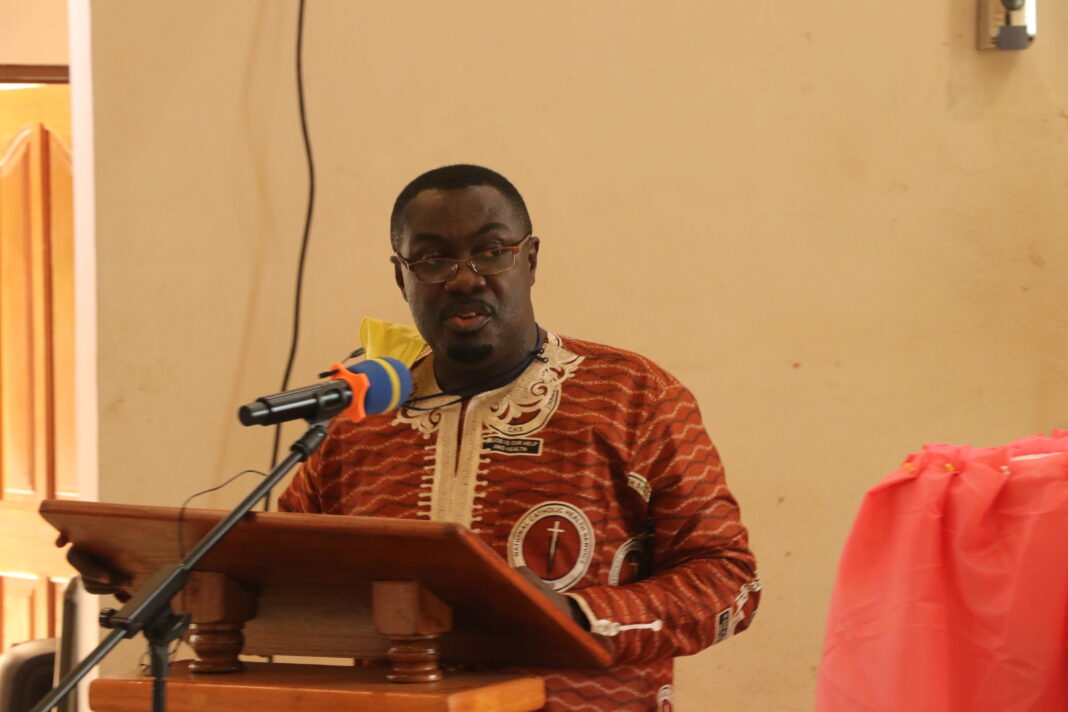The Director of the National Catholic Health Service, Mr. George Adjei has called for deepening partnerships with all relevant stakeholders- the Ministry of Health, Christian Health Association of Ghana Ghana Health Service, Regulatory bodies, NHIS, National Health Insurance Scheme to make Church health services thrive the way it is expected to be.
The Service needs to improve human resource management with a focus on two key elements-availability and productivity, he said at the launch of COVID-19 Response Project at Adomfie in the Catholic Archdiocese of Kumasi on October 15, 2021.
The project being embarked upon by the Conference of Major Superiors of Religious in Ghana (CMSRG) is dubbed: “Religious in Ghana Strengthening Covid19 Response.
Highlighting on the need to improve with respect to availability, he said, “we should be prepared to work towards getting the right skills (professionals) in the right mix and for productivity, we should look at employee productivity under worker performance.
However, according to him, beyond these, it was necessary to be mindful to continue to strengthen working relations with employees, particularly through their respective Labour Unions, professional associations and the Councils.
Again, he noted that in human resources management, for so long as specialist care was needed, Managers must continue to sponsor specialists in all the technical disciplines.
“Creating mentorship and skills sharing relationships between and among facilities with Municipal and Districts should be encouraged. Underlying this is telemedicine where professionals seek advice or are guided by colleagues located elsewhere. It has a powerful impact on case management and staff training. It is thus, one effective way to reduce referrals, improve patient outcomes and promote better collaboration in service delivery,” he stated.
This, Mr. Adjei indicated would take away all forms of mistrust that exist in some areas, noting, “Catholic health services should patronize the PPP because apart from benefiting from economies of scale, it has assisted in no small way to reduce counterfeit medicines from entering into the NCHS system. We know some institutions under the care of the Congregations have not patronized the Program well on this. It is the way to go.”
He said, “The communities where Church health services are prevalent have become more conscious of rights due to improvement in our literacy rates. It is manifesting in the sudden increase in medico-legal cases which end up in court or are settled at very high costs to the facilities.”
“This means that this is the time, more than ever, to give special attention to not only the quality of care given but also the entire process of care giving. This will help prevent these emerging issues,” he stated, adding, “In fact, damages imposed by the Courts for just one bad case is capable of sinking an entire facility; making all the efforts the Church has put into nurturing and developing it over the years useless.”
On the National Health Insurance Scheme, he said, “We have advocated time and again and will still say that the Scheme will continue to be the bane of Church health services unless its design is altered.”
“I share in the view by those advocating that the roles of payer for health services and regulator of the Scheme should be decoupled and that until this is achieved, Church health services will continue to be at the receiving end of changes in policies of the NHIA.”
Other factors, according to Mr. Adjei that might shape the future of healthcare delivery for church health services among others, include demand for accountability by the public through the media and Civil Society Organizations and Think-Tanks, information on the internet, over-concentration of professional staff in cities, environmental concerns about waste disposal, demand for specialist services by the middle class and proliferation of private insurance companies. Some of these may present as opportunities and others as threats.



